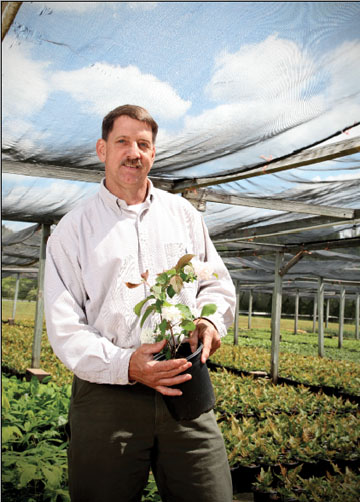Heirloom Treasures Take Root At Chambers County Nursery

Steve Thomas wasn’t raised in the gardening business. In fact, his green thumb didn’t develop until college when his wife suggested he consider studying horticulture.“I said, ‘That’s plants, isn’t it?’” Thomas recalled. “I really hadn’t had any exposure to horticulture.”Despite being green to the world of plants, Thomas enrolled in a horticulture class, which soon blossomed into a lifetime love of plants – especially heirloom varieties that were common in Southern gardens before 1900.Thomas was accepted to graduate school at Auburn University, where he studied ornamental horticulture. After graduation, he and his wife moved to Florida, where he worked for a horticulture distributor. In 1986, they decided it was time to put down their own roots in Alabama.They started Greene Hill Nursery with one greenhouse and a half-acre shade house. In the past 25 years, the nursery has flourished.
“We have about 8-to-10 acres of growing area, with five greenhouses and about an acre-and-a-half of shade,” Thomas said. “The rest of it is just in the open.” Greene Hill Nursery sits at the corner of Alabama Highway 147 and Alabama Highway 431 in Waverly, Ala., where Thomas spends his days caring for plants at his wholesale operation.
“We grow about 60 different varieties of plants,” he said. “We’re selling a lot of jasmine, whether it’s the winter jasmine or the Florida jasmine.” The nursery didn’t start out with that many varieties, though. The initial business venture was to reintroduce lilacs to the area.
“When we started our business, we started it with lilacs, the Cut Leaf Lilac and the Miss Kim Lilac,” Thomas said. “They were plants that weren’t used in the South much, and we decided that it was time to bring lilacs back to the South. We also grew winter honeysuckle, which is a wonderful shrub-type honeysuckle and forsythia (weeping forsythia). That’s kind of how we got started.”
Thomas defines heirloom plants as anything that was grown in gardens and distributed before 1900. Propagating them is done completely by hand.“We just take a small cutting (from the plant), cut the end of it off, scrape the leaves off and dip it into a rooting hormone,” he said. “We put them in a 72-cell or 50-cell tray (inside a greenhouse) and place them under a misting spray.”When the plants are well rooted, they are transplanted to larger pots and moved outside.While Thomas has perfected the art of raising plants, he says there were challenges along the way. The biggest of those came when the nursery first opened and he discovered a shortage of available water.“We drilled more wells and changed to watering on a tighter schedule to make sure we got enough water,” he said.Now that Thomas has years of experience under his belt, he is able to focus on the parts of the business he loves most.
“I love to watch a small plant grow into a finished shrub,” he said. “My specialty is sales. I love to get out and sell the plants, deliver them and watch people enjoy them.”Mac Higginbotham, Director of the Alabama Farmers Federation’s Horticulture Division, agrees that plants are a positive way to interact with people. “We all like to give plants to those who are going through a difficult time in their lives, and plants are thought to reduce stress and provide a positive physical, mental and social benefit,” Higginbotham said. “There is an additional benefit that comes to those distributing the very plants they nurtured tirelessly from start to finish.”Thomas’ customers are located in Alabama, Georgia, Mississippi and Tennessee. He sells to several re-wholesalers and garden centers. Over the years, he has developed friendships with many of his clients.“If you can’t build a friendship with your customer, then you’re just another supplier,” he said. “I think the ones that we do the best with are the people we get to know the best. A trusting relationship is always important.”
